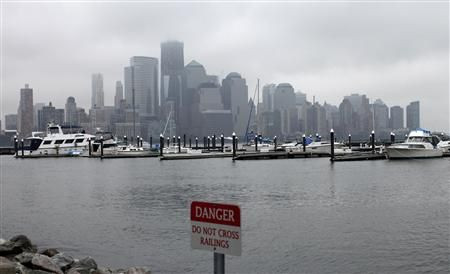Hurricane Irene: 5 Reasons to be Grateful It Came on a Weekend

OK, bad as Hurricane Irene is and will be, especially as it makes landfall in the New York City area, there are a couple reasons to be grateful it's hitting the U.S. mainland on a weekend and not a weekday.
Credit the National Weather Service, the National Hurricane Center, the National Oceanographic and Atmospheric Administration for having learned their lessons from Hurricane Katrina. With their data, based upon all kinds of supercomputers, satellite technology, instruments, ocean buoys and data analysis, these agencies plus private companies that specialize in catastrophe modeling have scared the daylights out of millions of people.
With justification. Hurricane Irene has killed already and may kill more. If it proves to make its New York area landfall in Long Beach, N.Y., in Nassau County, there could be huge hazards in a county with 1.3 million people.
Here are some reasons to be glad the warnings came when they did:
They allowed government officials, from governors to town supervisors, to warn their people. Evacuations are no fun for anyone. But nobody wants to experience a storm surge or tornado at home. Let's be glad we have erred on safety.
Imagine, too, if Irene's U.S. landfall were on a weekday. The potential for disaster increases many-fold. It sure looks strange for the Metropolitan Transportation Authority in New York to have closed the subways, buses, Long Island Rail Road and Metro North Railroad. Imagine all these networks up and running during a storm surge.
Remember the 5.8 magnitude earthquake on Aug. 23? We dodged a bullet there.
Most people are at home, rather than at work, so they can be evacuated or prepare for the worst. This is obvious. Industrial tragedies, bombings and fires are bad enough. In the U.S., unlike in Asia, most people don't work on Saturdays and Sundays. That's a huge plus.
Public institutions are largely closed. Schools, in states where the academic year has already started, don't hold classes on a weekend. Big hospitals usually are on slower schedules with fewer patients because clinics are shut. Big public events, like ball games or big festivals, can be postponed or canceled.
Point is: it's easier to prepare. Officials of all these places have their hands full, anyway, securing facilities and assuring patients, suppliers and neighbors.
On the weekend, people have to pay attention. Nobody knows what will happen when Irene strikes our own neighborhoods but we have more time to pay attention on a weekend. That's why local TV stations have gone wall-to-wall with coverage. For-pay websites among major newspapers are temporarily free.
That's another reason why public officials like governors, county executives and mayors are issuing robocalls and e-mails to citizens. If it were a regular weekday, who knows who'd pay attention.
Something known is better than an unknown. Pace Donald Rumsfeld, we'd rather face something we know about, like a dangerous hurricane, as opposed to something random. Like the Virginia earthquake, in which nobody was killed or apparently even injured. But that's raised major questions about the safety of 10 East Coast nuclear power plants which were not built to withstand such things.
The writer speaks from personal experience: 14 months ago, his community, Great Neck, in Nassau County, N.Y., where Irene may strike soon, experienced a tornado-like event the National Weather Service ultimately labeled a micro-burst, which felled thousands of trees in a very small area of perhaps two square miles, along with essentially the entire power grid. Nobody was killed
Damage to homes and public buildings was extensive. Many were without power for a week. Property losses were in the millions. But this was a random event that popped up around 3 on a summer afternoon.
Now that we may be facing terrible circumstances for the next few days, East Coast residents should be grateful we had the warnings and time to prepare.
May all be safe.
© Copyright IBTimes 2024. All rights reserved.





















